Online shopping has become integral to modern commerce, enabling customers to buy and sell goods and services through digital platforms. In Nigeria, three major online shopping platforms—Jiji, Jumia, 9jalist and Konga—have gained significant popularity and transformed how people engage in commerce.
This comprehensive review will explore these platforms’ origins, growth, services, partnerships, and impact on the Nigerian e-commerce landscape.
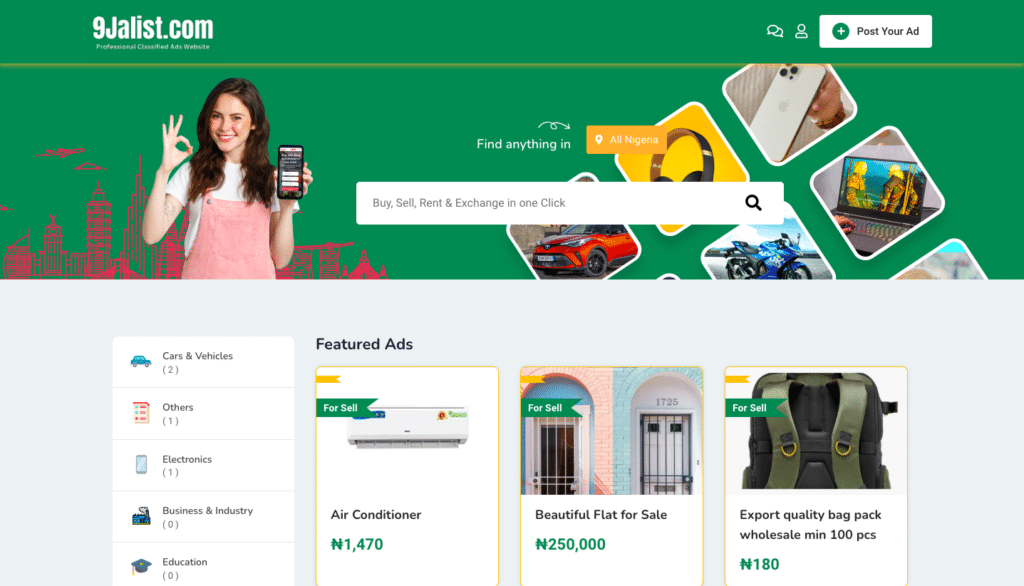
Jiji.ng, Jumia, and Konga: Comparison Table
| Aspect | 9jalist | Jiji | Jumia | Konga |
|---|---|---|---|---|
| Type of Platform | Classifieds Marketplace | Classifieds Marketplace | E-commerce Marketplace | E-commerce Marketplace |
| Founded | 2023 | 2014 | 2012 | 2012 |
| Headquarters | Lagos, Nigeria | Lagos, Nigeria | Lagos, Nigeria | Lagos, Nigeria |
| Product Categories | Wide range, including electronics, fashion, | Wide range, including electronics, fashion, | Various categories, including electronics, | Multiple options, including JumiaPay |
| vehicles, real estate, jobs, services | vehicles, real estate, jobs, services | home appliances, books, and more | home appliances, books, and more | |
| Business Model | Facilitates direct buying/selling between | Facilitates direct buying/selling between | Connects buyers and sellers on its platform, | Connects buyers and sellers on its platform, |
| individuals | individuals | handles transactions | handles transactions | |
| Logistics Service | None yet | No | Offers logistics service for package delivery | Offers delivery service |
| Payment Options | Various, including cash on delivery | Various, including cash on delivery | Multiple options, including KongaPay | Multiple options, including KongaPay |
| Key Features | Classified ads for products and services | Classified ads for products and services | – Extensive product range | – Marketplace for various products |
| – Wide range of categories | – Wide range of categories | – Partnership with various brands | – Partnership with multiple brands | |
| – Direct communication between buyers and | – Direct communication between buyers and | – Secure online payments | – Option to buy and sell products | |
| sellers | sellers | – Mobile app for easy shopping | – Regular discounts and promotions | |
| – Local and nationwide reach | – Local and nationwide reach | – Various payment options | – Convenient customer support | |
| – No transaction fees | – No transaction fees | – Delivery tracking and support | ||
| Competitive Advantage | Localized focus and no transaction fees | Localized focus and no transaction fees | Extensive product range and secure payments | Strong partnership network and marketplace |
| Challenges | Trust and safety concerns among users | Trust and safety concerns among users | Managing logistics for widespread delivery | Competing with other e-commerce giants |
| Contact Information | Website: jiji.ng | Website: jiji.ng | Website: jumia.com.ng | Website: konga.com |
| Phone: +234 0906 047 2321 | Phone: +234 1 440 8363 | Phone: 01 888 1102, 01 277 2361 | Phone: 01 460 5555, 0809 460 5555 | |
| Email: support@k4y.c59.myftpupload.com | Email: support@jiji.ng | Email: customercare@jumia.com.ng | Email: help@konga.com |
READ ALSO:
9Jalist
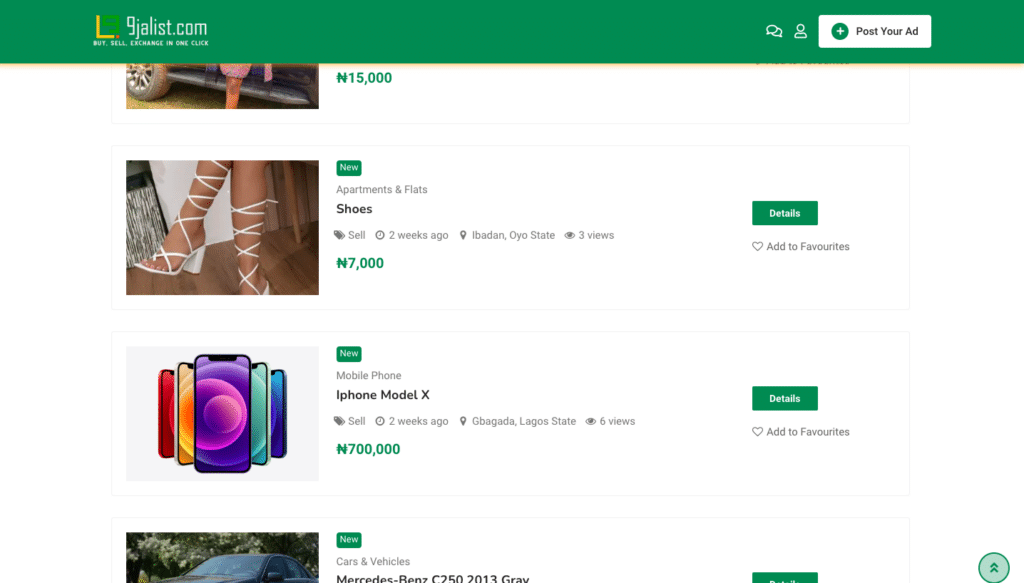
9Jalist is a newly emerging classified ads website in Nigeria that offers a platform for buying and selling a wide range of products and services. Similar to established platforms like Jiji, it seeks to facilitate local transactions and interactions. Here’s a brief overview of 9Jalist based on the provided information:
- Platform Type: Classifieds Ads Website
- Mission: To provide a user-friendly online marketplace where individuals and businesses in Nigeria can promote their offerings effectively.
- Key Features:
- Focus on user-friendly design and functionality.
- Targeting the local market, allowing people to buy and sell items within their city or street.
- Emphasis on promoting businesses through the platform.
- Offering features aimed at enhancing the classifieds experience.
- Website: 9jalist.com
- Selling and Advertising:
- Users can post ads for various purposes, including selling items, advertising jobs, renting apartments, and more.
- The platform emphasises that posting ads is 100% free.
- Localised Approach:
- Encourages interactions between people who are in the same city or neighbourhood.
- Aims to foster local buying and selling to simplify transactions.
- Focus on Design and Functionality:
- Aims to stand out by providing a user-friendly design and functionality.
- Mission:
- Strives to become Nigeria’s largest online marketplace, catering to individuals and organisations.
Prospective Comparison with Established Platforms:
- 9Jalist seems to follow a similar business model as other classified platforms like Jiji, which have proven successful in Nigeria.
- It targets a local audience, aligning with buying and selling within the same city or street.
- While the provided information is limited, the emphasis on user-friendly design and promoting businesses could be its unique selling point.
- As a new entrant, 9Jalist has the opportunity to learn from the successes and challenges of existing platforms to enhance its features and services.
Jiji.ng
In the vibrant world of e-commerce, Nigeria’s digital landscape has witnessed significant growth over the past decade. Among the trailblazers that have made their mark is Jiji.ng, an innovative online classifieds platform that has become a household name for buying and selling in Nigeria.
Since its inception in 2014, Jiji.ng has garnered millions of monthly users and clinched prestigious awards and strategic partnerships, solidifying its position as a leader in the market.
Founding and Early Success
Jiji.ng emerged on the scene in 2014, its birthplace being Lagos, Nigeria. The mastermind behind this digital phenomenon is CEO Anton Volianskyi. What began as an ambitious venture soon became an influential online marketplace catering to a wide range of needs.
Strategic Partnerships and Recognition
Two years after its inception, Jiji.ng struck up a notable partnership with Airtel, a global telecommunications services company. This alliance broadened Jiji’s reach and signified its capacity to engage in substantial collaborations within the industry.
In 2017, Jiji.ng received the Nigeria Internet Registration Association Awards, further solidifying its reputation as Nigeria’s most innovative online service. Additionally, the platform’s recognition continued to soar as it became a finalist at The West Africa Mobile Awards (WAMAS).
Expanding Horizons: Acquisitions and Growth
By January 2018, Jiji.ng boasted an impressive community with over 160,000 sellers and an astounding 7 million monthly users. The platform’s offerings extended beyond typical classifieds categories, encompassing a diverse array of products, including used cars, household goods, mobile phones, cosmetics, toys, pets, livestock, and electronics.
Jiji.ng also proved its versatility by allowing job openings to be listed on the site, creating a holistic ecosystem for users.
In June 2021, a significant milestone was reached as Jiji.ng acquired the automotive company Cars45. This strategic move signalled the platform’s ambition to diversify its services and solidified its position as a dominant player in the Nigerian e-commerce landscape.
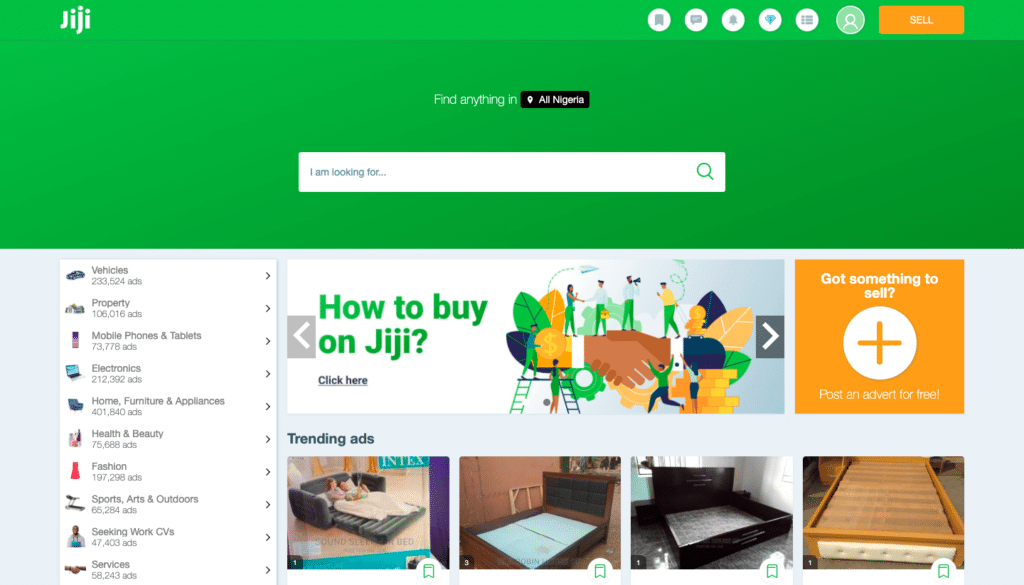
User-Centric Approach: The Mobile Application
Jiji.ng recognised the growing importance of mobile technology and responded by developing a user-friendly mobile application available for both Android and iOS users.
This app spread its wings across multiple African nations, including Nigeria, Kenya, Ghana, Uganda, Tanzania, and Ethiopia. The success of the mobile app was palpable, as Google Play statistics ranked Jiji App among the ten most downloaded apps in Nigeria.
Statistical Snapshot
To put Jiji.ng’s achievements into perspective, let’s delve into some key statistics that underscore its influence:
- Global Rank: #13,023
- Country Rank in Nigeria: #43
- Nigeria Category Rank: #1,847
- Total Visits: 3.7 million
- Bounce Rate: 35.67%
- Pages per Visit: 6.67
- Average Visit Duration: 6 minutes and 30 seconds
- Employees: 201 – 500
- Annual Revenue: $100.0 million – $200.0 million
Rising Through the Ranks: A Closer Look at Rankings
Jiji.ng’s ascent through the ranks is truly remarkable. Over the past three months, the platform’s global ranking has experienced a notable improvement, moving from 14,702 to 13,023. This progress is a testament to Jiji.ng’s consistent efforts to provide valuable services and engage its user base effectively.
Traffic and Engagement Analysis
Jiji.ng’s traffic has shown a commendable increase of 4.52% compared to the previous month. This is particularly evident when analysing the total visits in the last three months, with figures skyrocketing from 28.9 million to 86.7 million. Such an upsurge speaks volumes about Jiji.ng’s ability to capture and maintain visitor interest.
Global Footprint: Geography and Audience Composition
Nigeria continues to be the core audience for Jiji.ng, contributing to a staggering 82.07% of the platform’s desktop traffic. Additionally, the audience composition showcases a gender distribution of 65.57% male and 34.43% female visitors. The largest age group engaging with Jiji.ng falls within the 25 – 34-year-old bracket.
Audience Interests and Demographics
Understanding the audience’s interests is pivotal, and for Jiji.ng’s visitors, Computers, Electronics and Technology, Programming and Developer Software, and News & Media Publishers hold significant importance. The audience’s demographic makeup highlights most male users, while the age group of 25 – 34 years holds the highest engagement.
Competition and Marketing Channels
In the competitive landscape, Jiji.ng faces contenders like Olist.ng, Konga, and jumia.com. The platform primarily draws its traffic from Direct sources (56.40%) and Organic Search (33.42%), signifying its strong brand recognition and effective organic strategies.
Additionally, marketing channels such as Paid Search, Social, and Display offer untapped potential for Jiji.ng’s growth.
SEO and Keyword Strategy
Jiji.ng’s top organic keywords include terms like “jiji,” “jiji nigeria,” and “jiji.ng,” showcasing a focus on brand-related searches. This emphasis on branded terms indicates that Jiji.ng is a household name in the Nigerian digital landscape.
MORE READS:
Referral Traffic and Social Media Impact
The platform’s referral traffic reveals its diverse interests, including Investing, Digital Marketing, and News & Media Publishers categories. Regarding social media impact, YouTube, Facebook, and WhatsApp Webapp lead the charge, demonstrating Jiji.ng’s ability to engage audiences through various platforms.
Outgoing Links and Industry Affinity
Jiji.ng’s outgoing links encompass multiple categories, with Search Engines and Graphics Multimedia and Web Design leading. This link distribution mirrors the platform’s diverse offerings and its intention to connect users with relevant resources.
How to Sell/Register on Jiji: A Step-by-Step Guide
If you’re looking to sell your products or services on Jiji, a popular online marketplace, follow these steps to register as a seller and start listing your items:
- Step 1: Visit the Jiji Website Go to the Jiji website by typing “jiji.ng” in your browser’s address bar.
- Step 2: Sign Up or Log In. If you’re a new user, click the “Sign Up” button to create a new account. If you already have an account, click “Log In” and enter your credentials.
- Step 3: Choose Your Account Type. Select the option to register as a seller.
- Step 4: Provide Your Contact Information. Fill in the required information, including your name, phone number, and email address. Make sure to provide accurate contact details.
- Step 5: Verify Your Phone Number. Jiji will send you a verification code to the phone number you provided. Enter the code on the website to verify your phone number.
- Step 6: Create a Seller Profile. After phone verification, you’ll be prompted to create a seller profile. This may include information about your business, such as its name and a brief description.
- Step 7: Choose Your Preferred Payment Method. Select the payment method you’d like to use for transactions on Jiji. This could be through a bank account or a mobile money platform, depending on what’s available in your region.
- Step 8: Upload Your Products. Start adding your products or services to your Jiji store. Provide clear and detailed descriptions, including product images, prices, and any relevant information buyers might need.
- Step 9: Manage Your Listings Once your listings are live, you can manage them through your seller dashboard. You can edit, update, or remove listings as needed.
- Step 10: Respond to Inquiries. Be attentive to inquiries and messages from potential buyers. Promptly respond to questions and provide accurate information about your products.
Tips for Success:
- Use high-quality images for your listings to attract potential buyers.
- Provide detailed and accurate descriptions of your products.
- Be transparent about your selling items’ condition, size, and specifications.
- Set competitive prices based on market research.
- Respond to inquiries and messages in a timely manner to build trust with buyers.
- Consider offering promotions or discounts to attract more customers.
Jumia
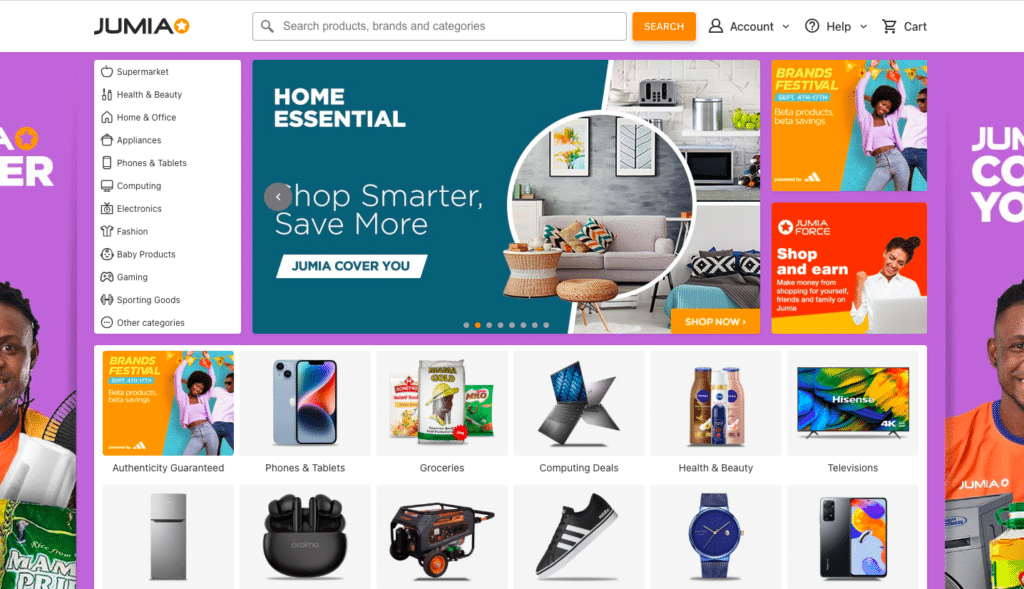
In the dynamic realm of African e-commerce, Jumia stands out as a pioneering Pan-African technology company that blends marketplace services, logistics, and payment solutions.
This versatile entity has transformed how Africans shop online and fostered partnerships that resonate with its commitment to fostering growth across the continent. From its inception to its strategic collaborations, Jumia’s journey is a testament to its role as a catalyst for digital entrepreneurship in Africa.
Foundation and Vision
Established in 2012 by former McKinsey consultants Jeremy Hodara and Sacha Poignonnec, Tunde Kehinde and Raphael Kofi Afaedor, Jumia’s beginnings marked a vision to revolutionise online shopping in Africa. The company commenced its operations in Nigeria, eventually expanding to Egypt, Morocco, Ivory Coast, Kenya, and South Africa.
Holistic Approach: Marketplace, Logistics, and Payment Services
At its core, Jumia encompasses three pivotal aspects: a marketplace, a logistics service, and a payment service. The marketplace serves as a virtual hub for sellers and buyers, while the logistics arm facilitates seamless package delivery through local partners.
Simultaneously, the payment services streamline transactions within the Jumia ecosystem, contributing to a cohesive online shopping experience.
Strategic Partnerships and Market Competition
Boasting partnerships with over 100,000 active sellers and individuals, Jumia positions itself as a vibrant hub for diverse offerings. While competing indirectly with the likes of retailers such as Jiji and Maybrands Limited, Jumia’s direct competitors include Konga in Nigeria and global giants like Amazon and Noon in Egypt.
Milestones and Expansion
Key milestones and strategic expansions have punctuated Jumia’s journey. Over time, it has expanded its presence to encompass multiple African countries, extending its reach to Egypt, Morocco, Ivory Coast, Kenya, and South Africa.
The company’s commitment to offering more than just an e-commerce platform led to the launch of Jumia Travel, Jumia Food, and Jumia Deals, catering to hotel bookings, food delivery, and an expansive array of products.
Innovations and Financial Achievements
In response to the evolving needs of its users, Jumia launched Jumia One, a multifunctional app that enables bill payments and more.
The introduction of JumiaPay brought secure payment solutions to the forefront, while the Jumia lending program extended financial assistance to vendors. Notably, the company achieved unicorn status in 2016, valued at over 1 billion USD, cementing its position as a leader in the African e-commerce landscape.
Global Recognition and Transformation
Jumia’s reputation transcends borders, with Jumia Nigeria’s e-commerce website, Jumia.com.ng, ranking as one of the most visited websites in the nation.
Beyond recognition, Jumia demonstrated its commitment to societal welfare through partnerships like the one with the United Nations Development Programme (UNDP) in Uganda, which aimed to support small and medium enterprises during the COVID-19 pandemic.
Paving the Path Ahead
Amidst leadership changes and adapting to shifting market trends, Jumia’s focus remains steadfast in optimising cost management and expanding its footprint outside capital cities. This approach mirrors the platform’s commitment to creating value in underserved regions and driving economic growth.
How to Sell on Jumia: A Step-by-Step Guide
Selling on Jumia involves setting up a seller account and listing your products on their platform. Here’s how to get started:
- Step 1: Visit the Jumia Seller Center Go to the Jumia Seller Center website by searching for “Jumia Seller Center” on your browser.
- Step 2: Sign Up or Log In. If you’re new to Jumia, click on the “Sign Up” button to create a new seller account. If you already have an account, log in using your credentials.
- Step 3: Complete Your Seller Profile. Fill in your business information, including your store name, contact details, and business documents (such as business registration).
- Step 4: Choose Your Payment Method. Select the payment method you prefer for receiving payments from Jumia customers.
- Step 5: List Your Products. Use the Seller Center tools to list your products. Provide clear images, detailed descriptions, and accurate pricing.
- Step 6: Manage Your Listings Monitor your listings and update them as needed. You can add or remove products, adjust prices, and manage stock levels.
- Step 7: Handle Orders and Customer Inquiries Once your listings are live, manage incoming orders and respond to customer inquiries promptly.
- Step 8: Ship Products When you receive orders, prepare and ship the products to customers. Use Jumia’s shipping partners or your own logistics.
- Step 9: Monitor Performance Regularly check your seller dashboard for insights into your sales performance and customer feedback.
- Step 10: Promote Your Store Consider participating in Jumia’s promotional events and offers to boost your sales.
How to Order on Jumia:
Ordering on Jumia is straightforward:
- Step 1: Visit the Jumia Website Go to the Jumia website by typing “jumia.com” in your browser’s address bar.
- Step 2: Search for Products. Use the search bar or browse categories to find the products you want to buy.
- Step 3: Select a Product. Click on a product to view its details, images, and pricing.
- Step 4: Add to Cart. Click the “Add to Cart” button to place the item in your shopping cart.
- Step 5: Review Your Cart. Click on the shopping cart icon to review the items in your cart. You can edit quantities or remove items if needed.
- Step 6: Proceed to Checkout. Click the “Checkout” button to proceed to the payment and shipping information page.
- Step 7: Provide Shipping Details. Enter your shipping address and contact information.
- Step 8: Choose a Payment Method. Select your preferred payment method, such as credit/debit card or cash on delivery.
- Step 9: Review and Confirm Order Review your order details, including the products, quantities, and total cost. Confirm your order.
- Step 10: Receive Confirmation You’ll receive an order confirmation email or notification with your order details.
Note: Using official methods for engaging with online platforms like Jumia is important. Hacking or any unauthorized access is illegal and unethical.
Konga
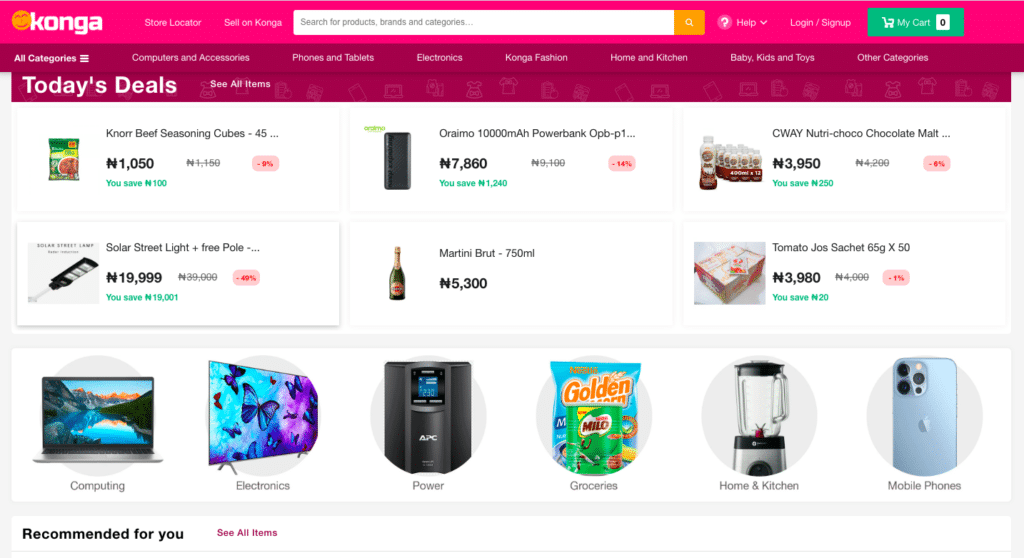
In the vibrant landscape of Nigerian e-commerce, Konga.com shines as a homegrown powerhouse that redefined online shopping. Founded in 2012 with headquarters in Lagos State, Konga’s journey is marked by innovative solutions, strategic partnerships, and a commitment to providing a comprehensive marketplace experience for sellers and buyers.
Sim Shagaya, the visionary founder of Konga, established the company in July 2012 with a staff of 20 people. The initial focus was on serving Lagos residents with various products in categories like Baby, Beauty, and Personal Care.
Konga soon expanded its scope to cover the entirety of Nigeria, reflecting a dynamic vision of connecting the nation’s consumers to diverse merchandise.
Diverse Product Offerings and Logistics
Konga’s appeal lies in its comprehensive product catalogue spanning consumer electronics, fashion, home appliances, books, children’s items, computers & accessories, phones and tablets, health care, and personal care products. The company goes beyond just offering products; it ensures timely shipments and deliveries through its logistics service, EXPRESS.
Strategic Evolution and Market Expansion
Strategic decisions and market demands propelled Konga’s evolution. Its launch of ‘Konga Mall’ marked a shift from first-party retail to a third-party marketplace model, catering to a wide array of sellers.
The company broadened its horizons by embracing diverse merchandise categories and venturing into third-party retail, mirroring the evolving e-commerce landscape.
Innovations and Partnerships
KongaPay, introduced in partnership with Nigerian commercial banks, addressed the challenges of online payment trustworthiness. This innovation facilitated easy, secure, and efficient online transactions, bolstering customer trust. The Konga Express service further streamlined the delivery process, ensuring timely delivery within 1-3 days.
Revolutionizing Nigerian Online Shopping
Konga’s transformative impact is epitomised by Konga Marketplace, a platform that democratises online retail by allowing businesses from all corners of Nigeria to participate.
Roadside sellers and small entrepreneurs found a stage to showcase their products, contributing to economic growth and employment. Introducing the Self-Fulfill Model added further value by offering sellers shipping agreements and flexible delivery options.
Acquisition and Synergy
Zinox, a Nigerian firm specialising in computers, acquired Konga strategically. The merger with Zinox’s retail outfit, Yudala, resulted in a stronger, unified entity under the Konga brand. This synergy showcased Konga’s dedication to providing an omnichannel retail experience, combining its online strength with Yudala’s extensive branch network.
Competition and Recognition
In a competitive landscape, Konga faces rivals like Jumia and Kilimall. Despite this, Konga’s distinctive niches, location, and agency networks have helped it hold its ground.
Konga’s contributions to Nigerian commerce have earned it accolades, including being ranked as the most visited website in Nigeria by Alexa Internet and recognition as a top startup in Nigeria.
How to Sell on Konga: A Step-by-Step Guide
To start selling on Konga, follow these steps:
- Registration: Create a Seller Account on Konga by visiting their official website. Provide the required information, such as your name, email, phone number, and company details.
- Verification: Konga will review your application and verify your information. You might need to provide additional documents to verify your identity and business details.
- Product Listing: Once your account is approved, log in to your Seller Account. Click on the “List a Product” option to start listing your products. Fill in all the necessary details like product name, description, images, price, and category.
- Product Approval: Konga’s team will review your product listings for quality and accuracy. Make sure your listings meet their guidelines to get approved quickly.
- Inventory Management: Keep track of your inventory levels on the Seller Center dashboard. Update the stock status to avoid selling products that are out of stock.
- Order Management: When a customer places an order for your product, you’ll receive a notification. Pack and ship the product within the specified time frame.
- Shipping and Delivery: You can use Konga’s logistics service, Konga Express, to handle shipping, or you can fulfil orders yourself. Make sure to provide accurate tracking information to the buyers.
- Payment: Konga will collect the payment from the customer and deduct their fees. Your earnings will be transferred to your designated bank account after deducting the necessary charges.
- Customer Service: Provide excellent customer service by promptly responding to customer inquiries and addressing any concerns they might have.
- Track Order: Regularly monitor your sales and customer feedback. Optimise your product listings, pricing, and customer service based on the feedback to improve your performance.
Conclusion
Jiji.ng’s journey from its founding in 2014 to its present status as Nigeria’s premier online classifieds platform is a testament to innovation, strategic partnerships, and a user-centric approach.
With millions of monthly users, a versatile mobile app, and an ever-expanding suite of services, Jiji.ng stands as a beacon of success in Nigeria’s digital landscape. As it continues to evolve and engage its diverse audience, Jiji.ng is poised to shape the future of e-commerce in the nation.
Similarly, Jumia’s transformative journey underscores its role as a trailblazer in Pan-African e-commerce. Through strategic partnerships, versatile services, and a commitment to digital entrepreneurship, Jumia continues to shape the continent’s online shopping landscape.
As it navigates challenges and embraces innovations, Jumia’s legacy as a catalyst for growth remains an integral part of Africa’s digital evolution.
Rounding off, Konga is a testament to the commitment to innovation, accessibility, and fostering economic growth. From its inception as a Lagos-based online retailer to becoming a national and continental leader in e-commerce, Konga’s impact resonates far beyond its digital realm.
Its ability to adapt, embrace partnerships, and cater to diverse needs ensures Konga’s continued relevance in the dynamic landscape of Nigerian online shopping.
FAQ
When is Jumia Black Friday?
Jumia’s Black Friday typically falls in November. Still, we recommend that you check the official Jumia website or follow their social media channels for the most accurate and up-to-date information on their sales events.
Jumia Seller Center and Customer Care Numbers?
To reach out, you can easily initiate a claim or reach us by phone at 01 888 1102 or 01 277 2361 during the hours of 9 am to 5 pm on weekdays. Additionally, don’t hesitate to reach out to your Key Account manager for any inquiries you may have or to arrange personalised training sessions.
What is Konga customer care?
Address for Contacting Konga Nigeria 40A, Town Planning Way, Kosofe, Lagos, Nigeria.
Contacting Konga for Online Shopping To engage in online shopping on Konga, the recommended platform to visit is their official website. Refer to the website address provided below.
Official Website for Konga Nigeria: Konga.com.
Operating Hours for Call Centre: 7 am – 8 pm (Monday – Friday) and 8 am – 6 pm (weekends).
Contact Number for Konga Nigeria (Phone: 01 460 5555 or 0809 460 5555)
How to Use Visa Debit Card for Online Shopping
To utilise a Visa debit card for online shopping, adhere to the following steps:
Select Payment Method: When checking out on the online store’s website, choose the payment method as “Credit Card” or “Debit/Credit Card.”
Enter Card Details: Input the 16-digit number on the front of your Visa debit card in the designated field.
Provide Expiry Date: Enter the expiration date of the card, usually mentioned after the “good through” or “valid through” text.
Enter CVV/CVC: Input the three-digit security code (CVV/CVC) on your card’s back.
Billing Address: Provide the billing address associated with the card. This is typically the address where you receive your bank statements.
Confirm Payment: Review the details you’ve entered and confirm the payment. Some online stores might ask for an additional verification step, such as a One-Time Password (OTP) sent to your registered mobile number.
Secure Payment Gateways: Ensure that your online store has a secure payment gateway. Look for the padlock symbol in the browser’s address bar and check if the URL starts with “https://” instead of “http://.”
Check for International Transactions: If you’re shopping on an international website, make sure your Visa debit card is enabled for international transactions. You may need to contact your bank to enable this feature.
Keep Transaction Records: Save or screenshot the transaction confirmation page as well as any email receipts you receive from the online store.
Monitor Account Activity: Regularly check your bank account statements for any unauthorised or suspicious transactions. If you notice anything unusual, contact your bank immediately.
